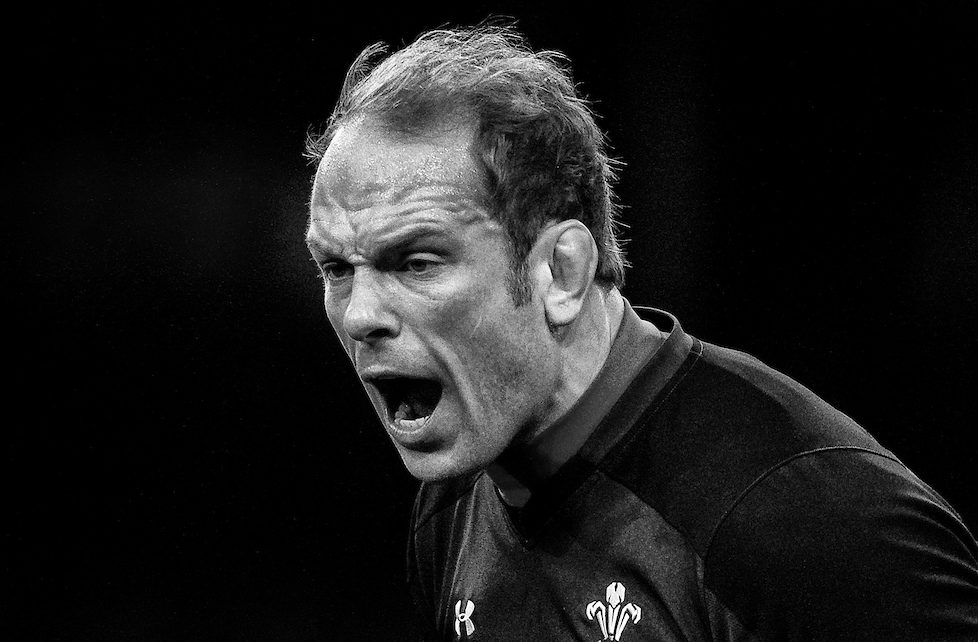Alun Wyn Jones will become the first player ever to win four Grand Slams if Wales beat France on Saturday night. Gareth Edwards managed three. So, the question is, does that now make AWJ the greatest Welsh rugby player of all time? Steffan Thomas thinks so.
Welsh rugby folklore is still dominated by the achievements of the great Wales sides of the 1970s who played starring roles in the most successful British & Irish Lions touring parties of all time.
Every era in every sport is dominated by world class athletes, but there are those who occasionally reach god-like status which merits statues and roads named after them.
Sir Gareth Edwards is widely considered the greatest rugby player of all time, let alone Welsh international.
His statue is present in St David’s shopping centre in Cardiff while the image of the son of Gwaun-Cae-Gurwen, covered from top to bottom in mud, is one of the most iconic images of the old Five Nations.
For decades, Edwards’ title as Wales’ finest rugby player has never been questioned. But is it finally time to open that debate?
The stars of the Seventies hold almost a mythical status, not just in Wales but around the rugby world.

The fact that nearly all of them are now in their seventies seems not to have dimmed their grandeur, even among people who were not born when they were in their pomp.
Age may have wearied them, but it has not diminished their appeal.
If you were to travel halfway around the globe, to New Zealand or South Africa, your average rugby fan would have heard of Edwards, Phil Bennett, Barry John, Gerald Davies, and JPR Williams almost 50 years on from when they last took the field.
But what of Alun Wyn Jones? Will New Zealanders scurry for his autograph at Auckland airport half a century from now?
He may not be the flashiest player of all time, and he may not have scored many individual tries from 50 metres out, but surely the current Wales captain is now a challenger to Edwards’ title?
Jones’ modesty means he will play down his achievements, but statistically the 35-year-old is head and shoulders above any player that has ever worn the red of Wales.
This weekend he will win his 148th Wales cap, having also played nine times for the British & Irish Lions in Test matches.
That’s 156 international matches – 93 more than Edwards.

He already has four Six Nations championships to his name, including three Grand Slams, and four Triple Crowns.
We all know it is a futile exercise comparing players who not only played in different eras but in different positions.
Edwards won 53 caps for Wales, and a further 10 for the Lions in an era when there were far fewer Test matches played.
It took him 11 years to win those 63 caps.
Yet Jones, on the other hand, is the only man in the professional era to have played in nine consecutive Lions Tests and his own international career now spans 15 years.
When Jones began that 2005-06 season that saw him capped for the first time, he didn’t have to worry about reaction on Twitter. There was no Twitter. It didn’t exist.
If you were to put a highlights reel together of Edwards it would consist of some of the most spectacular pieces of individual brilliance in the entire history of rugby union.
A highlights reel wouldn’t do much to convince us of Jones’ challenge to Edwards’ throne.
It’s time for #SCOvWAL, so naturally we had to take a look at Gareth Edwards’ 1972 try – one of the most iconic in Championship history.
Were there or watching on TV? Let us know what your memories of this one are!#GuinnessSixNations pic.twitter.com/NLWDQp1xNj
— Guinness Six Nations (@SixNationsRugby) March 4, 2019
There’s no length of the field tries to look back upon, no diving touchdowns having out-thought, outmanoeuvred and out-sprinted the opposition.
But the Ospreys man gets through a monumental amount of work and is the sort of player who holds his team together, while his grafting allows others to shine.
Jones’ achievements have not fallen in his lap by way of talent alone. While he is far more naturally gifted than he’s given credit for, his teammates say he’s the first to smash the tackle bags in training, is the last off the pitch after the game, and is the one to bring his players’ focus back to the here and now.
Jones is to Wales what John Eales was to the great Australian sides of the 1990s, what Martin Johnson was to the 2003 England World Cup winning squad, and what Sean Fitzpatrick was to the invincible All Blacks side of the late 1980s.
He is on the same level as those greats, if not better. When you look around at the world’s best second rows such as Brodie Retallick, Maro Itoje and Eben Etzebeth, Jones might not have their X-factor or athleticism, but as an all-round package he is even better.
Jones’ value to this Wales team is that he’s the glue which holds it all together.
Year 8 haven’t just been cooking. Nathan, Alex and Will have also done fact files or presentations on Alun Wyn Jones. Da iawn bechgyn. 👑👑👑🏉😀🏴 pic.twitter.com/1OFkh1ePj6
— Radyr Cymraeg (@radyr_cymraeg) March 1, 2021
He’s the man who pushes his players to levels they may not have thought they were capable of. He makes them more than the sum of their parts.
Jones has achieved all this in the most physically brutal of rugby eras where every hit is like a car crash.
The greatest player of all time isn’t necessarily the most talented player.
It is the one with the biggest influence – either directly or indirectly.
That is why Jones has arguably surpassed Edwards as Wales’ greatest ever rugby player.
He has done more, achieved more, factored more. Even if you hadn’t noticed.





